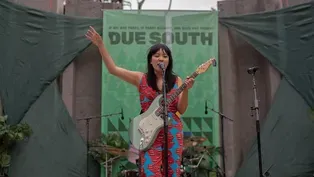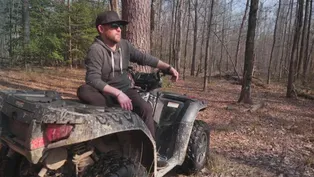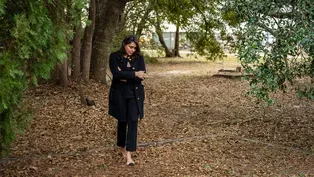
Jesmyn Ward Reads From Her Memoir 'Men We Reaped'
Clip: Episode 3 | 2m 13sVideo has Closed Captions
Two-time National Book Award winner Jesmyn Ward reads from her memoir "Men We Reaped."
Two-time National Book Award winner Jesmyn Ward is from DeLisle, Mississippi, also known as "Wolftown." Ward wrote her memoir "Men We Reaped," in memory of her late brother and four of her friends. She laments the erasure of her ancestors and culture.

Jesmyn Ward Reads From Her Memoir 'Men We Reaped'
Clip: Episode 3 | 2m 13sVideo has Closed Captions
Two-time National Book Award winner Jesmyn Ward is from DeLisle, Mississippi, also known as "Wolftown." Ward wrote her memoir "Men We Reaped," in memory of her late brother and four of her friends. She laments the erasure of her ancestors and culture.
How to Watch Southern Storytellers
Southern Storytellers is available to stream on pbs.org and the free PBS App, available on iPhone, Apple TV, Android TV, Android smartphones, Amazon Fire TV, Amazon Fire Tablet, Roku, Samsung Smart TV, and Vizio.
Buy Now

More from Southern Storytellers
We're highlighting the music, literary, and film creators featured in the show. Explore the recommended reading list, the Southern Storytellers Spotify playlist, and more.Providing Support for PBS.org
Learn Moreabout PBS online sponsorship"We are in Wolf Town, distant past to 1977.
Before DeLisle was named DeLisle after a French settler, the early settlers called it Wolf Town.
Pine and oak and sweet gum grow in tangles from the north down to the south of the town to the DeLisle Bayou.
The Wolf River, brown and lazy, snakes its way through DeLisle, fingers the country in creeks before emptying into the bayou.
When people ask me about my hometown, I tell them it was called after a wolf before it was partially tamed and settled.
I want to impart something of its wild roots, its early savagery.
Calling it Wolf Town hints at the wildness at the heart of it."
There are graves all through here, through this wooded area, and like as you can see right here, the Black people like were buried here in the back of the graveyard.
And so the tree line sort of separated the front, which is like the white section from the back, which is the Black section.
And see, it makes me worried, like even now when I'm walking, it makes me worried that I'm walking over someone and I don't even know it.
I remember being shocked when I came here for the first time because, [deep sigh] because I had naively assumed, [laughs] you know, that death was like the great equalizer, right?
And so it was just sort of shocking to come here and see, you know, like the final resting places of, you know, my family members would be erased.
It's just heartbreaking because I feel like this happens all the time, you know, like there's this erasure of people, this erasure of the past, this erasure of these like lived histories, right?
And so I wanna push back against that, right, because it shouldn't happen.
[somber music]
Video has Closed Captions
The series continues as Southern creators take us home to the places that define them. (30s)
Justin Moore Discusses the Inspiration for His Songwriting
Video has Closed Captions
Justin Moore shows us the land he grew up on and remembers his grandfather. (1m 13s)
Natasha Trethewey Returns to New Orleans
Video has Closed Captions
Pulitzer Prize winner Natasha Trethewey returns to New Orleans. (2m 31s)
Providing Support for PBS.org
Learn Moreabout PBS online sponsorship













